Books on consciousness
A list of books relating to the hard problem of consciousness. Regularly updated cos I keep finding new stuff all the time.
A list of books relating to the hard problem of consciousness. Regularly updated cos I keep finding new stuff all the time.
2016
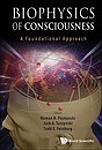 Poznanski, Tuszynski, Feinberg (eds.)
Poznanski, Tuszynski, Feinberg (eds.)
Biophysics Of Consciousness: A Foundational Approach
(World Scientific 2016)
How the brain produces consciousness and subjectivity remains one of the greatest challenges to science. This volume unites physicists, neuroscientists, and psychiatrists in the attempt to understand consciousness through a foundational approach encompassing ontological, evolutionary, neurobiological, and Freudian perspectives. See World Scientific | Amazon | Google
 Susan Greenfield
Susan Greenfield
A Day in the Life of the Brain: The Neuroscience of Consciousness from Dawn Till Dusk
(Penguin 2016)
Each of us has a unique, subjective inner world, one that we can never share directly with anyone else. But how do our physical brains actually give rise to this rich and varied experience of consciousness? Greenfield brings together a series of astonishing new, empirically-based insights into consciousness as she traces a single day in the life of your brain. See Penguin | Amazon | Google
 Max Velmans
Max Velmans
Towards a Deeper Understanding of Consciousness: Selected works of Max Velmans
(Routledge 2016)
In this volume, Velmans reflects on his long-spanning and varied career, considers the highs and lows, and offers reactions to those who have responded to his published work over the years. A unique and compelling collection of the best publications in consciousness studies from one of the few psychologists to treat the topic systematically and seriously. See Routledge | Amazon | Google
 George Jaroszkiewicz
George Jaroszkiewicz
Images of Time: Mind, Science, Reality
(Oxford 2016)
Ever been bewildered by the many different notions of time in such diverse fields as physics, mathematics, philosophy, religion, history, and science fiction? This book will help you unravel fact from fiction. It provides a broad survey of many of these views, covering historical, cultural, philosophical, biological, mathematical and physical images of time. See Oxford | Amazon | Google
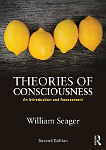 William Seager
William Seager
Theories of Consciousness: An Introduction and Assessment
(Routledge 2016, second edition)
Thoroughly revised and expanded, this second edition of Seager’s 1999 book provides a fresh and up-to-date introduction and includes new chapters on animal consciousness, reflexive consciousness, combinatorial forms of panpsychism and neutral monism, as well as a significant new chapter on physicalism, emergence and consciousness. See Routledge | Amazon | Google
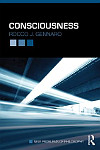 Rocco J. Gennaro
Rocco J. Gennaro
Consciousness
(Routledge 2016)
Consciousness is arguably the most important interdisciplinary area in contemporary philosophy of mind, with an explosion of research over the past thirty years from philosophers, psychologists, and scientists. Gennaro provides a clear introduction to the landscape and a fair-minded critical survey of various theories of consciousness. See Routledge | Amazon | Google
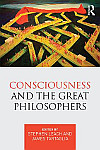 Stephen Leach & James Tartaglia (eds.)
Stephen Leach & James Tartaglia (eds.)
Consciousness and the Great Philosophers: What Would They Have Said About Our Mind-Body Problem?
(Routledge 2016)
This book addresses the question of how the great philosophers of the past might have reacted to the contemporary problem of consciousness. Each of the thirty-two chapters within this edited collection focuses on a major philosophical figure from the history of philosophy, from Anscombe to Xuanzang, and imaginatively engages with the problem from their perspective. See Routledge | Amazon | Google
 Howard Robinson
Howard Robinson
From the Knowledge Argument to Mental Substance: Resurrecting the Mind
(Cambridge 2016)
Robinson offers a comprehensive defense of the knowledge argument, presents a strong case for substance dualism, and shows that materialism cannot accommodate or explain the ‘hard problem’ of consciousness. He also challenges one of the main motivations for physicalism and tries to prove that we must be simple immaterial selves. See Cambridge | Amazon | Google
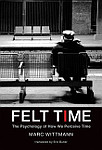 Marc Wittmann
Marc Wittmann
Felt Time: The Psychology of How We Perceive Time
(MIT 2016, trans. Erik Butler)
We have widely varying perceptions of time. Children have trouble waiting for anything. Boredom is connected to our sense of time passing. As we grow older, time seems to speed up. Drawing on the latest insights from psychology and neuroscience, Wittmann explores the riddle of subjective time and offers a new answer to the question of how we experience time. See MIT | Amazon | Google
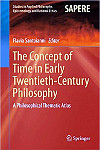 Flavia Santoianni (ed.)
Flavia Santoianni (ed.)
The Concept of Time in Early Twentieth-Century Philosophy: A Philosophical Thematic Atlas
(Springer 2016)
A collection of authoritative contributions on the concept of time in early twentieth-century philosophy. Structured in the form of a thematic atlas, the book is divided into three main sections and covers the work of a wide range of thinkers from Bergson and Husserl to Derrida, Cassirer and Wittgenstein to Foucault, and Guillaume and Einstein to Barbour. See Springer | Amazon | Google
 G. Brüntrup & Ludwig Jaskolla (eds.)
G. Brüntrup & Ludwig Jaskolla (eds.)
Panpsychism: Contemporary Perspectives
(Oxford 2016)
Recent debates in philosophy of mind have reached an impasse. Reductive physicalism cannot account for the phenomenal mind and non-reductive physicalism cannot secure a causal role for the mental. Dualism is hard to square with a naturalist evolutionary framework. In sixteen essays, this book critically examines panpsychism as a genuine alternative. See Oxford | Amazon | Google
 Stephan Blatti & Paul F. Snowdon (eds.)
Stephan Blatti & Paul F. Snowdon (eds.)
Animalism: New Essays on Persons, Animals, and Identity
(Oxford 2016)
What is the nature of the human person? Animalism has a straightforward answer: we are animals. Ignored for a long time in philosophical discussion, this idea has recently gained considerable support in metaphysics and philosophy of mind. This is the first volume to be devoted to this important topic and promises to set the agenda for the next stage in the debate. See Oxford | Amazon | Google
 Scott Sehon
Scott Sehon
Free Will and Action Explanation: A Non-Causal, Compatibilist Account
(Oxford 2016)
When people act, we explain their behavior by citing their reasons. The dominant view is that this is a form of causal explanation. Sehon defends a non-causal account of action and agency, according to which such explanation is irreducibly teleological rather than causal. This account undermines the appeal of the view that free will is not compatible with determinism. See Oxford | Amazon | Google
 R. D. Ingthorsson
R. D. Ingthorsson
McTaggart’s Paradox
(Routledge 2016)
McTaggart’s argument for the unreality of time set the agenda for twentieth-century philosophy of time. Scholars have long assumed that his argument does not rest on any contentious ontological principles. Ingthorsson shows that this is incorrect: McTaggart himself claimed that his argument rested on ontological principles that underwrote his idealist metaphysics. See Routledge | Amazon | Google
 Simon Prosser
Simon Prosser
Experiencing Time
(Oxford 2016)
We are aware of time on many scales, from brief flickers of change to the unfolding of our lives over decades. But do these encounters reveal the true nature of temporal reality? To the extent that temporal reality is as it seems, how do we come to be aware of it? And to the extent that it is not, why does it seem that way? See Oxford | Amazon | Google | Ian Phillips review
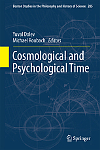 Yuval Dolev & Michael Roubach (eds.)
Yuval Dolev & Michael Roubach (eds.)
Cosmological and Psychological Time
(Springer 2016)
This book examines the many faces of philosophy of time, including its metaphysical aspects, natural science issues, and the consciousness of time. It also counters the cleavage between analytic and continental traditions by clarifying their underlying presuppositions and suggesting ways to bridge their differences. See Springer | Amazon | Google
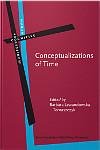 Barbara Lewandowska-Tomaszczyk (ed.)
Barbara Lewandowska-Tomaszczyk (ed.)
Conceptualizations of Time
(John Benjamins 2016)
In this interdisciplinary volume, novel approaches to time are proposed that consider temporality without time, on the one hand, and the coding of time in language and gestures, on the other. They demonstrate that time is conceptualized not only in terms of space but in terms of other domains of human experience as well. See John Benjamins | Amazon | Google
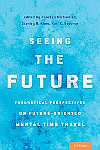 Michaelian, Klein & Szpunar (eds.)
Michaelian, Klein & Szpunar (eds.)
Seeing the Future: Theoretical Perspectives on Future-Oriented Mental Time Travel
(Oxford 2016)
Episodic memory is often understood as a form of mental “time travel” into the personal past. Recent research has revealed striking similarities between episodic memory and future-oriented mental time travel. This volume brings together leading contributors in both empirical and theoretical disciplines to examine the human ability to imagine future scenarios. See Oxford | Amazon | Google
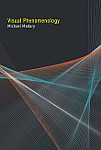 Michael Madary
Michael Madary
Visual Phenomenology
(MIT 2016)
Madary examines visual experience, drawing on both phenomenological and empirical methods of investigation. He finds that these two approaches—careful, philosophical description of experience and the science of vision—independently converge on the same result: visual perception is an ongoing process of anticipation and fulfillment. See MIT | Amazon | Google
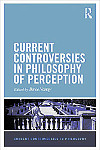 Bence Nanay (ed.)
Bence Nanay (ed.)
Current Controversies in Philosophy of Perception
(Routledge 2016)
An up-to-date overview of the philosophy of perception by numerous experts in the field. Can perception be unconscious? What is the relation between perception and attention? What properties can we perceive? Are perceptual states representations? How is vision different from hearing or smell? How do these sense modalities interact with one another? See Routledge | Amazon | Google
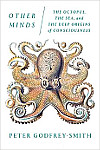 Peter Godfrey-Smith
Peter Godfrey-Smith
Other Minds: The Octopus, the Sea, and the Deep Origins of Consciousness
(Farrar, Straus & Giroux 2016)
Although mammals and birds are widely regarded as the smartest creatures, it has lately become clear that a distant branch of the tree of life has also sprouted higher intelligence: the cephalopods, consisting of the squid, the cuttlefish, and the octopus. Godfrey-Smith tells a bold new story of how subjective experience first crept into being: a story that largely occurs in the ocean. See Amazon | Google
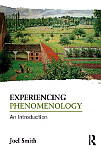 Joel Smith
Joel Smith
Experiencing Phenomenology: An Introduction
(Routledge 2016)
This is an outstanding introduction to phenomenology. Approaching fundamental phenomenological questions from a critical, systematic perspective whilst paying careful attention to classic phenomenological texts, Smith’s book possesses a clarity and breadth that will be welcomed by students coming to the subject for the first time. See Routledge | Amazon | Google
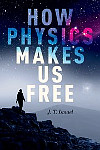 J. T. Ismael
J. T. Ismael
How Physics Makes Us Free
(Oxford 2016)
The first book to truly examine the question of what physics tells us about whether or not we are free to act. Ismael provides a deeply informed account of what physics tells us about ourselves. The result is a vision that is abstract, alien, illuminating, and—Ismael argues—affirmative of most of what we all believe about our own freedom. See Oxford | Amazon | Google
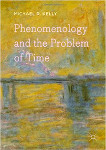 Michael R. Kelly
Michael R. Kelly
Phenomenology and the Problem of Time
(Palgrave Macmillan 2016)
Kelly explores the problem of time and immanence in the work of Husserl, Heidegger, Merleau-Ponty, and Derrida. He provides the framework for evaluating Husserl’s efforts to break free of modern philosophy’s notions of immanence, as well as the influence Heidegger’s criticism of Husserl exercised over Merleau-Ponty and Derrida. See Palgrave | Amazon | Google
 Mark Rowlands
Mark Rowlands
Memory and the Self: Phenomenology, Science and Autobiography
(Oxford 2016)
Our memories are who we are. But our experiences are mostly forgotten and our memories often distorted. Imagine writing your autobiography only to find most of it redacted and much of the rest rewritten. What would make it a coherent account of a life? The answer, Rowlands argues, lies in a largely unrecognized form of memory: Rilkean memory. See Oxford | Amazon | Google | The Brains Blog
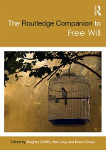 K. Timpe, M. Griffith, N. Levy (eds.)
K. Timpe, M. Griffith, N. Levy (eds.)
The Routledge Companion to Free Will
(Routledge 2016)
The first volume to draw together leading experts on every aspect of free will, from those central to current philosophical debates, to non-western perspectives, to scientific contributions and to those who know the rich history of the subject. Sixty one chapters are framed by a general introduction and briefer introductions for each of the six sections. See Routledge | Amazon | Google
 William Jaworski
William Jaworski
Structure and the Metaphysics of Mind: How Hylomorphism Solves the Mind-Body Problem
(Oxford 2016)
The first book to show how hylomorphism can be used to solve mind-body problems. Such problems are byproducts of a worldview that rejects structure. Without a principle which distinguishes the parts of the physical universe that can think, feel and perceive from those that can’t, the existence of those powers can start to look inexplicable and mysterious. See Oxford | Amazon | Google
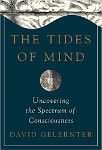 David Gelernter
David Gelernter
The Tides of Mind: Uncovering the Spectrum of Consciousness
(Liveright 2016)
Gelernter marshals evidence from psychological and scientific research as well as the works of Marcel Proust, Franz Kafka, Austen, Charlotte Bronte, Ernest Hemingway, J. M. Coetzee and many others to advance a new paradigm for the study of human consciousness. An astonishingly ambitious and beautifully written book. See Liveright | Amazon | Google | Chicago Tribune review
 Chris Nunn
Chris Nunn
New Directions in Consciousness Studies: SoS Theory and the Nature of Time
(Routledge 2016)
Using the physical concept of ‘broken symmetry,’ Nunn shows how conscious mind may be rooted in temporality: a view supported by a wide range of anomalous phenomena. Early chapters deal with our nature and suggest that mind can usefully be viewed as a type of dynamic landscape. Later chapters develop a theory (SoS theory) of the basis of consciousness. See Routledge | Amazon | Google
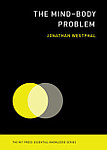 Jonathan Westphal
Jonathan Westphal
The Mind-Body Problem
(MIT 2016)
Westphal examines the mind-body problem in detail, laying out the reasoning behind the various solutions offered in the past. He then examines the largely forgotten neutral monist theories of mind and body and proposes his own version. This version is unique among neutral monist theories in offering an account of mind-body interaction. See MIT | Amazon | Google
 Anthony J. Lisska
Anthony J. Lisska
Aquinas’s Theory of Perception: An Analytic Reconstruction
(Oxford 2016)
While much has been devoted to Aquinas’s texts, little has been devoted to his theory of perception and less still on a discussion of inner sense. The thesis of intentionality serves as the backdrop of Lisska’s analysis. The principal thrust is on the importance of inner sense—an overlooked area of Aquinas’s philosophy of mind—with special reference to the vis cogitativa. See Oxford | Amazon | Google
 Shelley Weinberg
Shelley Weinberg
Consciousness in Locke
(Oxford 2016)
The idea of consciousness as a form of non-evaluative self-awareness, Weinberg argues, runs through Locke’s philosophy. Perceptions of ideas are complex mental states wherein consciousness is a constituent. This solves an “inconsistency” in Locke’s model of the mind and explains how we can know things if knowledge is just the perception of an agreement of ideas. See Oxford | Amazon | Google
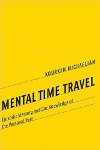 Kourken Michaelian
Kourken Michaelian
Mental Time Travel: Episodic Memory and Our Knowledge of the Personal Past
(MIT 2016)
Current philosophical approaches to memory rest on assumptions that are incompatible with data coming from psychology. Michaelian argues that abandoning those assumptions will improve our understanding of memory. His novel, integrated account of episodic memory, memory knowledge, and their evolution is a step in that direction. See MIT | Amazon | Google | The Brains Blog
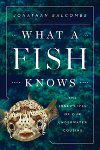 Jonathan Balcombe
Jonathan Balcombe
What a Fish Knows: The Inner Lives of Our Underwater Cousins
(Macmillan 2016)
There are more than thirty thousand species of fish—more than mammals, birds, reptiles and amphibians combined—but we rarely consider how they think, feel, and behave. Balcombe upends our assumptions, portraying fish not as unfeeling, dead-eyed, feeding machines but as sentient, aware, social and even Machiavellian—much like us. See Macmillan | Amazon | Google
 Todd E. Feinberg & Jon M. Mallatt
Todd E. Feinberg & Jon M. Mallatt
The Ancient Origins of Consciousness: How the Brain Created Experience
(MIT 2016)
By considering neurobiological features related to consciousness, Feinberg and Mallatt argue that consciousness appeared earlier in evolutionary history than is often assumed. About 520 to 560 million years ago, they explain, the great “Cambrian explosion” of animal diversity produced the first complex brains, accompanied by the first appearance of consciousness. See MIT | Amazon | Google

Biophysics Of Consciousness: A Foundational Approach
(World Scientific 2016)
How the brain produces consciousness and subjectivity remains one of the greatest challenges to science. This volume unites physicists, neuroscientists, and psychiatrists in the attempt to understand consciousness through a foundational approach encompassing ontological, evolutionary, neurobiological, and Freudian perspectives. See World Scientific | Amazon | Google

A Day in the Life of the Brain: The Neuroscience of Consciousness from Dawn Till Dusk
(Penguin 2016)
Each of us has a unique, subjective inner world, one that we can never share directly with anyone else. But how do our physical brains actually give rise to this rich and varied experience of consciousness? Greenfield brings together a series of astonishing new, empirically-based insights into consciousness as she traces a single day in the life of your brain. See Penguin | Amazon | Google

Towards a Deeper Understanding of Consciousness: Selected works of Max Velmans
(Routledge 2016)
In this volume, Velmans reflects on his long-spanning and varied career, considers the highs and lows, and offers reactions to those who have responded to his published work over the years. A unique and compelling collection of the best publications in consciousness studies from one of the few psychologists to treat the topic systematically and seriously. See Routledge | Amazon | Google

Images of Time: Mind, Science, Reality
(Oxford 2016)
Ever been bewildered by the many different notions of time in such diverse fields as physics, mathematics, philosophy, religion, history, and science fiction? This book will help you unravel fact from fiction. It provides a broad survey of many of these views, covering historical, cultural, philosophical, biological, mathematical and physical images of time. See Oxford | Amazon | Google

Theories of Consciousness: An Introduction and Assessment
(Routledge 2016, second edition)
Thoroughly revised and expanded, this second edition of Seager’s 1999 book provides a fresh and up-to-date introduction and includes new chapters on animal consciousness, reflexive consciousness, combinatorial forms of panpsychism and neutral monism, as well as a significant new chapter on physicalism, emergence and consciousness. See Routledge | Amazon | Google

Consciousness
(Routledge 2016)
Consciousness is arguably the most important interdisciplinary area in contemporary philosophy of mind, with an explosion of research over the past thirty years from philosophers, psychologists, and scientists. Gennaro provides a clear introduction to the landscape and a fair-minded critical survey of various theories of consciousness. See Routledge | Amazon | Google

Consciousness and the Great Philosophers: What Would They Have Said About Our Mind-Body Problem?
(Routledge 2016)

This book addresses the question of how the great philosophers of the past might have reacted to the contemporary problem of consciousness. Each of the thirty-two chapters within this edited collection focuses on a major philosophical figure from the history of philosophy, from Anscombe to Xuanzang, and imaginatively engages with the problem from their perspective. See Routledge | Amazon | Google

From the Knowledge Argument to Mental Substance: Resurrecting the Mind
(Cambridge 2016)
Robinson offers a comprehensive defense of the knowledge argument, presents a strong case for substance dualism, and shows that materialism cannot accommodate or explain the ‘hard problem’ of consciousness. He also challenges one of the main motivations for physicalism and tries to prove that we must be simple immaterial selves. See Cambridge | Amazon | Google

Felt Time: The Psychology of How We Perceive Time
(MIT 2016, trans. Erik Butler)
We have widely varying perceptions of time. Children have trouble waiting for anything. Boredom is connected to our sense of time passing. As we grow older, time seems to speed up. Drawing on the latest insights from psychology and neuroscience, Wittmann explores the riddle of subjective time and offers a new answer to the question of how we experience time. See MIT | Amazon | Google

The Concept of Time in Early Twentieth-Century Philosophy: A Philosophical Thematic Atlas
(Springer 2016)
A collection of authoritative contributions on the concept of time in early twentieth-century philosophy. Structured in the form of a thematic atlas, the book is divided into three main sections and covers the work of a wide range of thinkers from Bergson and Husserl to Derrida, Cassirer and Wittgenstein to Foucault, and Guillaume and Einstein to Barbour. See Springer | Amazon | Google

Panpsychism: Contemporary Perspectives
(Oxford 2016)
Recent debates in philosophy of mind have reached an impasse. Reductive physicalism cannot account for the phenomenal mind and non-reductive physicalism cannot secure a causal role for the mental. Dualism is hard to square with a naturalist evolutionary framework. In sixteen essays, this book critically examines panpsychism as a genuine alternative. See Oxford | Amazon | Google

Animalism: New Essays on Persons, Animals, and Identity
(Oxford 2016)
What is the nature of the human person? Animalism has a straightforward answer: we are animals. Ignored for a long time in philosophical discussion, this idea has recently gained considerable support in metaphysics and philosophy of mind. This is the first volume to be devoted to this important topic and promises to set the agenda for the next stage in the debate. See Oxford | Amazon | Google

Free Will and Action Explanation: A Non-Causal, Compatibilist Account
(Oxford 2016)
When people act, we explain their behavior by citing their reasons. The dominant view is that this is a form of causal explanation. Sehon defends a non-causal account of action and agency, according to which such explanation is irreducibly teleological rather than causal. This account undermines the appeal of the view that free will is not compatible with determinism. See Oxford | Amazon | Google

McTaggart’s Paradox
(Routledge 2016)
McTaggart’s argument for the unreality of time set the agenda for twentieth-century philosophy of time. Scholars have long assumed that his argument does not rest on any contentious ontological principles. Ingthorsson shows that this is incorrect: McTaggart himself claimed that his argument rested on ontological principles that underwrote his idealist metaphysics. See Routledge | Amazon | Google

Experiencing Time
(Oxford 2016)

We are aware of time on many scales, from brief flickers of change to the unfolding of our lives over decades. But do these encounters reveal the true nature of temporal reality? To the extent that temporal reality is as it seems, how do we come to be aware of it? And to the extent that it is not, why does it seem that way? See Oxford | Amazon | Google | Ian Phillips review

Cosmological and Psychological Time
(Springer 2016)

This book examines the many faces of philosophy of time, including its metaphysical aspects, natural science issues, and the consciousness of time. It also counters the cleavage between analytic and continental traditions by clarifying their underlying presuppositions and suggesting ways to bridge their differences. See Springer | Amazon | Google

Conceptualizations of Time
(John Benjamins 2016)
In this interdisciplinary volume, novel approaches to time are proposed that consider temporality without time, on the one hand, and the coding of time in language and gestures, on the other. They demonstrate that time is conceptualized not only in terms of space but in terms of other domains of human experience as well. See John Benjamins | Amazon | Google

Seeing the Future: Theoretical Perspectives on Future-Oriented Mental Time Travel
(Oxford 2016)
Episodic memory is often understood as a form of mental “time travel” into the personal past. Recent research has revealed striking similarities between episodic memory and future-oriented mental time travel. This volume brings together leading contributors in both empirical and theoretical disciplines to examine the human ability to imagine future scenarios. See Oxford | Amazon | Google

Visual Phenomenology
(MIT 2016)
Madary examines visual experience, drawing on both phenomenological and empirical methods of investigation. He finds that these two approaches—careful, philosophical description of experience and the science of vision—independently converge on the same result: visual perception is an ongoing process of anticipation and fulfillment. See MIT | Amazon | Google

Current Controversies in Philosophy of Perception
(Routledge 2016)
An up-to-date overview of the philosophy of perception by numerous experts in the field. Can perception be unconscious? What is the relation between perception and attention? What properties can we perceive? Are perceptual states representations? How is vision different from hearing or smell? How do these sense modalities interact with one another? See Routledge | Amazon | Google

Other Minds: The Octopus, the Sea, and the Deep Origins of Consciousness
(Farrar, Straus & Giroux 2016)
Although mammals and birds are widely regarded as the smartest creatures, it has lately become clear that a distant branch of the tree of life has also sprouted higher intelligence: the cephalopods, consisting of the squid, the cuttlefish, and the octopus. Godfrey-Smith tells a bold new story of how subjective experience first crept into being: a story that largely occurs in the ocean. See Amazon | Google

Experiencing Phenomenology: An Introduction
(Routledge 2016)
This is an outstanding introduction to phenomenology. Approaching fundamental phenomenological questions from a critical, systematic perspective whilst paying careful attention to classic phenomenological texts, Smith’s book possesses a clarity and breadth that will be welcomed by students coming to the subject for the first time. See Routledge | Amazon | Google

How Physics Makes Us Free
(Oxford 2016)
The first book to truly examine the question of what physics tells us about whether or not we are free to act. Ismael provides a deeply informed account of what physics tells us about ourselves. The result is a vision that is abstract, alien, illuminating, and—Ismael argues—affirmative of most of what we all believe about our own freedom. See Oxford | Amazon | Google

Phenomenology and the Problem of Time
(Palgrave Macmillan 2016)

Kelly explores the problem of time and immanence in the work of Husserl, Heidegger, Merleau-Ponty, and Derrida. He provides the framework for evaluating Husserl’s efforts to break free of modern philosophy’s notions of immanence, as well as the influence Heidegger’s criticism of Husserl exercised over Merleau-Ponty and Derrida. See Palgrave | Amazon | Google

Memory and the Self: Phenomenology, Science and Autobiography
(Oxford 2016)
Our memories are who we are. But our experiences are mostly forgotten and our memories often distorted. Imagine writing your autobiography only to find most of it redacted and much of the rest rewritten. What would make it a coherent account of a life? The answer, Rowlands argues, lies in a largely unrecognized form of memory: Rilkean memory. See Oxford | Amazon | Google | The Brains Blog

The Routledge Companion to Free Will
(Routledge 2016)
The first volume to draw together leading experts on every aspect of free will, from those central to current philosophical debates, to non-western perspectives, to scientific contributions and to those who know the rich history of the subject. Sixty one chapters are framed by a general introduction and briefer introductions for each of the six sections. See Routledge | Amazon | Google

Structure and the Metaphysics of Mind: How Hylomorphism Solves the Mind-Body Problem
(Oxford 2016)
The first book to show how hylomorphism can be used to solve mind-body problems. Such problems are byproducts of a worldview that rejects structure. Without a principle which distinguishes the parts of the physical universe that can think, feel and perceive from those that can’t, the existence of those powers can start to look inexplicable and mysterious. See Oxford | Amazon | Google

The Tides of Mind: Uncovering the Spectrum of Consciousness
(Liveright 2016)
Gelernter marshals evidence from psychological and scientific research as well as the works of Marcel Proust, Franz Kafka, Austen, Charlotte Bronte, Ernest Hemingway, J. M. Coetzee and many others to advance a new paradigm for the study of human consciousness. An astonishingly ambitious and beautifully written book. See Liveright | Amazon | Google | Chicago Tribune review

New Directions in Consciousness Studies: SoS Theory and the Nature of Time
(Routledge 2016)
Using the physical concept of ‘broken symmetry,’ Nunn shows how conscious mind may be rooted in temporality: a view supported by a wide range of anomalous phenomena. Early chapters deal with our nature and suggest that mind can usefully be viewed as a type of dynamic landscape. Later chapters develop a theory (SoS theory) of the basis of consciousness. See Routledge | Amazon | Google

The Mind-Body Problem
(MIT 2016)

Westphal examines the mind-body problem in detail, laying out the reasoning behind the various solutions offered in the past. He then examines the largely forgotten neutral monist theories of mind and body and proposes his own version. This version is unique among neutral monist theories in offering an account of mind-body interaction. See MIT | Amazon | Google

Aquinas’s Theory of Perception: An Analytic Reconstruction
(Oxford 2016)
While much has been devoted to Aquinas’s texts, little has been devoted to his theory of perception and less still on a discussion of inner sense. The thesis of intentionality serves as the backdrop of Lisska’s analysis. The principal thrust is on the importance of inner sense—an overlooked area of Aquinas’s philosophy of mind—with special reference to the vis cogitativa. See Oxford | Amazon | Google

Consciousness in Locke
(Oxford 2016)
The idea of consciousness as a form of non-evaluative self-awareness, Weinberg argues, runs through Locke’s philosophy. Perceptions of ideas are complex mental states wherein consciousness is a constituent. This solves an “inconsistency” in Locke’s model of the mind and explains how we can know things if knowledge is just the perception of an agreement of ideas. See Oxford | Amazon | Google

Mental Time Travel: Episodic Memory and Our Knowledge of the Personal Past
(MIT 2016)

Current philosophical approaches to memory rest on assumptions that are incompatible with data coming from psychology. Michaelian argues that abandoning those assumptions will improve our understanding of memory. His novel, integrated account of episodic memory, memory knowledge, and their evolution is a step in that direction. See MIT | Amazon | Google | The Brains Blog

What a Fish Knows: The Inner Lives of Our Underwater Cousins
(Macmillan 2016)
There are more than thirty thousand species of fish—more than mammals, birds, reptiles and amphibians combined—but we rarely consider how they think, feel, and behave. Balcombe upends our assumptions, portraying fish not as unfeeling, dead-eyed, feeding machines but as sentient, aware, social and even Machiavellian—much like us. See Macmillan | Amazon | Google

The Ancient Origins of Consciousness: How the Brain Created Experience
(MIT 2016)
By considering neurobiological features related to consciousness, Feinberg and Mallatt argue that consciousness appeared earlier in evolutionary history than is often assumed. About 520 to 560 million years ago, they explain, the great “Cambrian explosion” of animal diversity produced the first complex brains, accompanied by the first appearance of consciousness. See MIT | Amazon | Google
Menu
 What’s a logical paradox?
What’s a logical paradox? Achilles & the tortoise
Achilles & the tortoise The surprise exam
The surprise exam Newcomb’s problem
Newcomb’s problem Newcomb’s problem (sassy version)
Newcomb’s problem (sassy version) Seeing and being
Seeing and being Logic test!
Logic test! Philosophers say the strangest things
Philosophers say the strangest things Favourite puzzles
Favourite puzzles Books on consciousness
Books on consciousness Philosophy videos
Philosophy videos Phinteresting
Phinteresting Philosopher biographies
Philosopher biographies Philosopher birthdays
Philosopher birthdays Draft
Draftbarang 2009-2024  wayback machine
wayback machine
 wayback machine
wayback machine